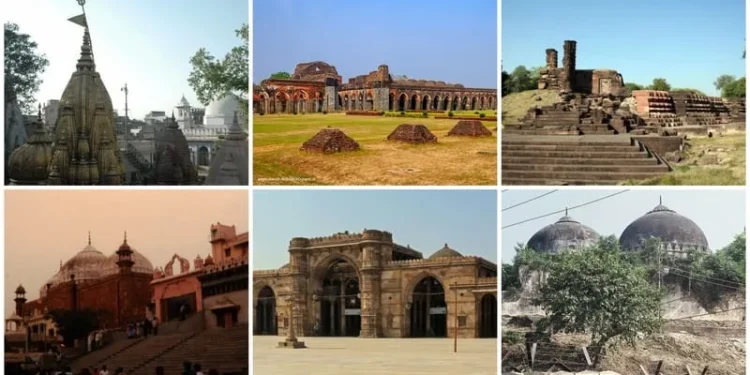Certainly! Here’s a summary of the article titled “Unravelling the truth: Know about the temples on which the mosques have been built”:
India’s rich history spans thousands of years, filled with epic tales, grand infrastructures, immense wealth, and countless temples. Unfortunately, many of these temples were lost or destroyed due to invasions and the rule of the Mughals and British. Even more tragically, some of these temples were not merely destroyed but were converted into mosques. These places, once resonating with ancient Sanskrit music, prayers, and slokas, now bear no trace of their Hindu origins.
Here are a few notable examples:
1. **Ram Janmabhoomi Mandir, Ayodhya – Babri Masjid**:
– According to Hindus, the land where the Babri Mosque was built in 1528 is the ‘Ram Janmabhoomi’ (birthplace of Lord Ram).
– It is believed that Mir Baqi, a general of Mughal king Babur, destroyed a pre-existing Ram Mandir to construct the Babri Masjid.
– Both communities have worshipped at this “mosque-temple,” with Muslims praying inside the mosque and Hindus outside it.
– Today, the Ram Mandir is being constructed at this historically significant location.
2. **Krishna Janmabhoomi Temple, Mathura – Shahi Idgah Mosque**:
– The Sri Krishna Janmabhoomi Temple, located in Mathura, Uttar Pradesh, is believed to be the legendary birthplace of Lord Krishna.
– The temple, originally built 5,000 years ago, saw significant upgrades during the reign of Chandragupta II around 400 AD.
– After being demolished in 1017 AD, it was rebuilt by Bir Singh Bundela, a king under the Mughal Empire.
– However, Emperor Aurangzeb later destroyed the temple again and constructed the Shahi Idgah Mosque above it.
– This site holds deep historical and religious significance, symbolizing the enduring legacy of Lord Krishna in Hinduism.
3. **Kashi Vishwanath Temple, Varanasi – Gyanvapi Mosque**:
– The Kashi Vishwanath Temple, dedicated to Lord Shiva, is one of the most renowned Hindu temples located in Varanasi, the holiest city for Hindus.
– It is a significant pilgrimage site where Hindus are expected to visit at least once in their lifetime.
– Unfortunately, the Gyanvapi Mosque was constructed over a portion of the original temple.
– Despite these historical challenges, the temple remains a symbol of devotion and spirituality for millions of Hindus.
It is essential to recognize and preserve the historical significance of these temples and acknowledge the impact of their conversion into mosques on Hindu religious beliefs and architectural heritage.
Source: Conversation with Copilot
Unravelling the truth: Know about the temples on which the mosques have ….
https://organiser.org/2024/05/28/239839/bharat/unravelling-the-truth-know-about-the-temples-on-which-the-mosques-have-been-built/



![[ Hpi ] Thousands of Pilgrims Flock to Kedarnath, Get Stranded Near Sitapur](https://hinduvishwa.org/wp-content/uploads/2024/05/Kedarnath-May-26-75x75.jpg)
![[ India Today ] Ohio senator JD Vance thanks wife, a Hindu, for helping him find Christian faith](https://hinduvishwa.org/wp-content/uploads/2024/06/us-senator-jd-vance-reveals-how-his-hindu-wife-usha-helped-him-find-his-christian-faith-image-re-272530504-16x9_0-120x86.webp)










